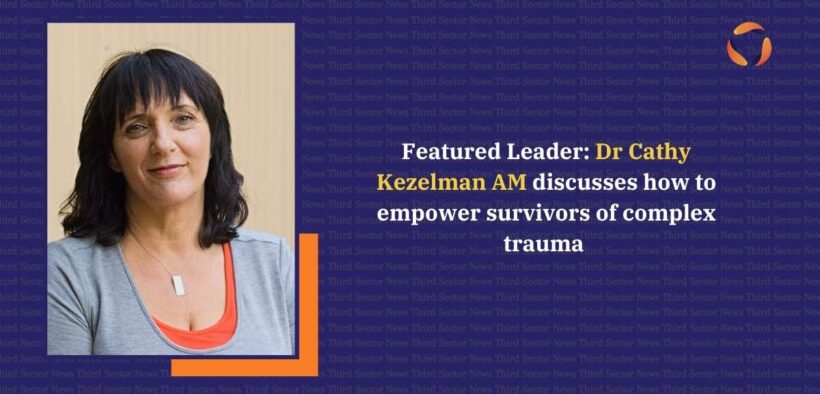The Blue Knot Foundation has been empowering recovery and building resilience for the more than 5 million Australian adults living with the impacts of complex trauma as Australia’s National Centre for Excellence for Complex Trauma.
Today, the Blue Knot Foundation provides specialist trauma counselling to adult survivors of childhood trauma including child sexual abuse and supports survivors of institutional child sexual abuse through the National Redress Scheme.
Dr Cathy Kezelman AM, President of the foundation has been leading the Blue Knot Foundation team for over two decades and has grown the Blue Knot Foundation from a peer support body to the National Centre of Excellence for Complex Trauma.
With almost two decades with the Blue Knot Foundation under your belt, what continues to motivate you to work in the not-for-profit sector?
In the two decades I’ve been with Blue Knot, advocating and working in the area of complex trauma, we have seen substantial social change in this area. With a number of Royal Commissions, other inquiries and increased public discourse around issues of violence, abuse and trauma, some of the stigma which has long silenced victims and survivors is gradually being eroded.
This has been accompanied by increasing awareness and understanding of the challenges many survivors face at different times in their lives, and greater acceptance of the need to invest in programs, services, and systems that support hope and possibilities for recovery.
The not-for-profit sector is replete with passionate people and many worthwhile causes that help change lives for the better. That said, there is still a long way to go in our area of work, but knowing the difference we can make together, not only to individuals but families, communities, and society, continues to motivate me to continue my work and our work in this space.
What are the key strategies and goals the Blue Knot Foundation have in addressing the issues that individuals who have experienced trauma face?
Blue Knot has four core strategic pillars which underpin its mission – to empower survivors to recover and build resilience from complex trauma. Complex trauma refers to repeated, often extreme ongoing violence, abuse or neglect experienced as a child, young person or adult, or across different ages.
Our core strategic pillars focus on:
- Providing trauma-informed services to survivors and their personal supporters through our Helplines, educational workshops and survivor resources.
- Building the capacity of diverse workforces and organisations to empower survivors to heal from the impacts of complex trauma.
- Developing and disseminating knowledge and resources informed by lived and living experience, practice and research for survivors, family members and professionals.
- Partnering with diverse stakeholders to best deliver on our purpose, and reach as many survivors, families and communities as possible.
In addition to raising awareness around complex trauma and the needs of survivors, we feel these strategic pillars all contribute to supporting survivors to heal.
When providing your services, what are some of the crucial factors you and your team need to keep in mind?
The services we provide are in many cases life-changing. They are delivered to people who have experienced a lot of trauma in their lives, sometimes also inadvertently from service providers.
Many survivors have particular vulnerabilities and sensitivities, which make it very difficult for them to reach out and seek help. Many struggle with feeling safe as they have been subjected to repeated threats. Many also find it difficult to trust others, because they have been betrayed in the past. This is why it is important for us to be present when engaging with each individual, seek to find out what it is they need and want in that moment, and do what we can to support them to feel safe. We also need to be very aware of the possibility of triggering strong reactions or memories, and supporting people to be grounded and as calm as possible.
What are some of the setbacks you have faced in your career as a leader in the NFP sector?
While inspiring, the not-for-profit sector brings many challenges, as does leadership at times. The reality is that many issues such as the area in which Blue Knot operates are complex, pervasive and challenging. Resources are tight and the need is substantial. At times, funding is unreliable and unpredictable, and there is a constant balancing act between ensuring sustainability and focussing on the core purpose of the organisation.
Leaders in the NFP sector are often pulled in multiple directions, struggling to maintain strategic focus because daily demands are frequent and fast-paced. Despite all of the challenges, my colleagues are a constant source of learning and support and the successes far outweigh the challenges.
Anything you would like to highlight?
The health and wellbeing of every human being is critical, but for those whose childhood was sabotaged or young adulthood violated, emotional and physical equilibrium can be more elusive. Everyone deserves to be treated with dignity and respect and provided with an opportunity for connection and a full and rich life. Blue Knot works at the coalface of making that happen for many people whose life path was upended through no fault of their own.
Related: Opinion: Supporting survivors of complex trauma on their journeys towards bettering their physical and mental health
Menchie Khairuddin is a writer Deputy Content Manager at Akolade and content producer for Third Sector News. She is passionate about social affairs specifically in mixed, multicultural heritage and not-for-profit organisations.
































































































































































